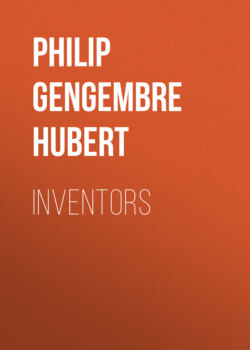Читать книгу Inventors - Philip Gengembre Hubert - Страница 3
На сайте Литреса книга снята с продажи.
PREFACE
ОглавлениеTable of Contents
This book, dealing with our great inventors, their origins, hopes, aims, principles, disappointments, trials, and triumphs, their daily life and personal character, presents just enough concerning their inventions to make the story intelligible. The history is often a painful one. When poor Goodyear, the inventor of vulcanized rubber, was one day asked what he wanted to make of his boys, he is said to have replied: "Make them anything but inventors; mankind has nothing but cuffs and kicks for those who try to do it a service."
Meanwhile, the value of the work done by great inventors is widely acknowledged. In a remarkable sketch of the history of civilization, Professor Huxley remarked, in 1887, that the wonderful increase of industrial production by the application of machinery, the improvement of old technical processes and the invention of new ones, constitutes the most salient feature of the world's progress during the last fifty years. If this was true a few years ago, its truth is still more apparent to-day. It is safe to say that within fifty years power, light, and heat will cost half, perhaps one-tenth, of what they do now; and this virtually means that in 1943 mankind will be able to buy decent food, shelter, and clothing for half or one-tenth of the labor now required. Steam is said to have reduced the working hours of man in the civilized world from fourteen to ten a day. Electricity will mark the next giant step in advance.
With the many and superb tools now at our service, of which our fathers knew comparatively nothing—steam, electricity, the telegraph, telephone, phonograph, and the camera—we and our descendants ought to accomplish even greater wonders than these. As invention thus rises in the scale of importance to humanity, the history of the pioneers and, to the shame of mankind be it said, the martyrs of the art, becomes of intense interest. In the annals of hero-worship the inventor of the perfecting press ought to stand before the great general, and Elias Howe should rank before Napoleon. Whitney, Howe, Morse, and Goodyear, to mention but a few of our Americans, contributed thousands of millions of dollars to the nation's wealth and received comparatively nothing in return. Their history suggests as pertinent the inquiry whether our patent laws do not need a radical change. The burden and cost of proving that an invention deserves no protection ought to fall upon whoever infringes a patent granted by the Government. At present it is all the other way.
P.G.H., Jr.
New York, September, 1893.
